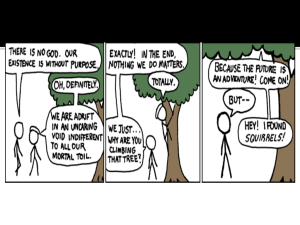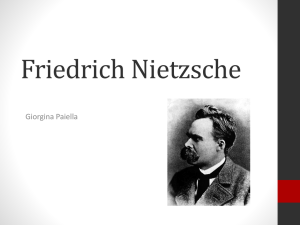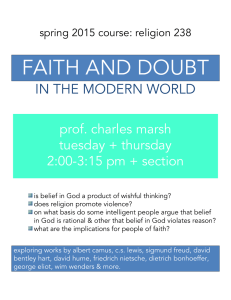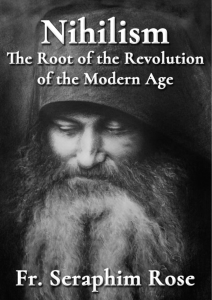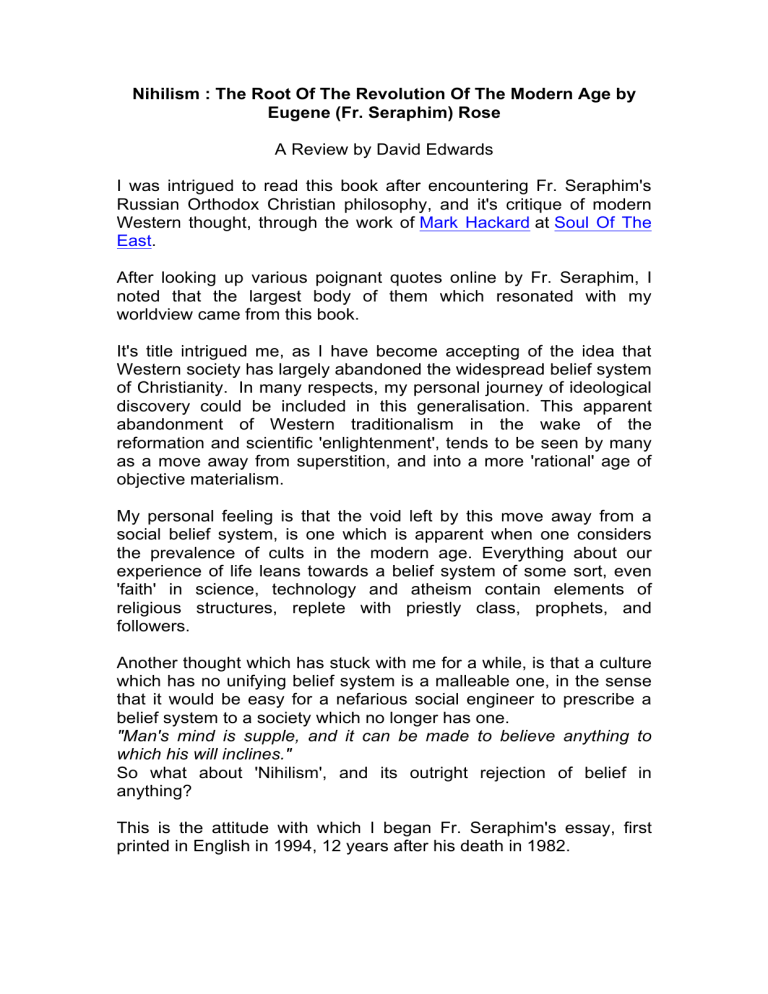
Nihilism : The Root Of The Revolution Of The Modern Age by Eugene (Fr. Seraphim) Rose A Review by David Edwards I was intrigued to read this book after encountering Fr. Seraphim's Russian Orthodox Christian philosophy, and it's critique of modern Western thought, through the work of Mark Hackard at Soul Of The East. After looking up various poignant quotes online by Fr. Seraphim, I noted that the largest body of them which resonated with my worldview came from this book. It's title intrigued me, as I have become accepting of the idea that Western society has largely abandoned the widespread belief system of Christianity. In many respects, my personal journey of ideological discovery could be included in this generalisation. This apparent abandonment of Western traditionalism in the wake of the reformation and scientific 'enlightenment', tends to be seen by many as a move away from superstition, and into a more 'rational' age of objective materialism. My personal feeling is that the void left by this move away from a social belief system, is one which is apparent when one considers the prevalence of cults in the modern age. Everything about our experience of life leans towards a belief system of some sort, even 'faith' in science, technology and atheism contain elements of religious structures, replete with priestly class, prophets, and followers. Another thought which has stuck with me for a while, is that a culture which has no unifying belief system is a malleable one, in the sense that it would be easy for a nefarious social engineer to prescribe a belief system to a society which no longer has one. "Man's mind is supple, and it can be made to believe anything to which his will inclines." So what about 'Nihilism', and its outright rejection of belief in anything? This is the attitude with which I began Fr. Seraphim's essay, first printed in English in 1994, 12 years after his death in 1982. "The Nihilist wills the world, which once revolved about God, to revolve now about - nothing. Can this be? - an order founded upon nothing? Of course it cannot; it is self-contradiction, it is suicide." The books introduction, titled 'The Question Of Truth', prefaces the larger criticism of Nihilism throughout the rest of the chapter, with the assertion that at spiritual Nihilism's root is the desire for revolution in the modern age, and the rejection of order and its pre-existing truth (explicitly in the author's view, the absolute truth of Christian faith). The clearest examples of modern revolution which the author gives are the rise of Hitler's National Socialism, the Bolshevik Revolution, and the Dadaist attack on art. "The new art celebrates the birth of a new species, the creature of the lower depths, subhumanity." All three of these examples, it would seem, embody the central theme of inversion of a previous order. This inversion inevitably happens via some form of violence. "Violence is no merely incidental aspect of the Nihilist Revolution, but a part of its essence." The revolving of power, (to give the term 'revolution' its literal meaning) and the destruction of old paradigms to replace the abyss left by this destruction, seems to be the end goal of a culture's transition through such a period of ideological Nihilism. "Nihilism, it is presumed, is the apocalyptic sign of the advent of a new and better age." As I have already stated, this modern rejection of 'superstition' of the profound and any sense of the sublime, seems to come full circle. The modern 'religious' beliefs of our times, strive to find the objectivity of the rejected 'absolute truth' by deifying Science, Nature, Social Order, even the mundane idol worship of empty materialism. These are all symptoms of Nihilist 'reformation' of the social order. In the previous age of widespread Christian doctrine, mankind saw itself as a reflection of an aspect of the divine, in our inverted age, we are creeping ever closer, via technological means, of ourselves becoming Gods. This is what the author terms as the end goal of the Nihilist transition, man's transformation of himself into a deity, desperate to fill the vacuum he has created by killing off his own God. "The god of Nihilism, nothingness, is an emptiness, a vacuum waiting to be filled." As creatures who on the whole, thrive on superstition, even when we claim to reject it, most of humanity refuses to accept a life without some form of meaning. With the rejection of old conceptions of 'divine' order, fate, destiny or purpose, the focus of our existence has largely become centred on the material, the tangible and the finiteness of our existence. With this comes an emphasis on the visceral fulfilment of worldly desires, as opposed to striving towards a higher expectation of working towards some form of better place in an afterlife. "In the Nihilist 'new earth' all human energy is to be devoted to worldly concerns; the whole human environment and every object in it are to serve the cause of 'production' and to remind men that their only happiness lies in this world; there is to be established, in fact, absolute despotism of worldliness. The artificial world erected by men who will remove the last vestige of divine influence in the world, and the last trace of faith in men, promises to be so allencompassing and so omnipresent that it will be all but impossible for men to see, to imagine, or even to hope for anything beyond it. This world, from the Nihilist point of view, will be one of perfect 'realism' and total 'liberation'; in actual fact it will be the vastest and most efficient prison men have ever known, for - in the precise words of Lenin - 'there will be no way of getting away from it, there will be 'nowhere to go'." Fr. Seraphim sees the two major 'prophets' of this observed Nihilism which has shaped our age as Nietzsche and Lenin. The former he attributes as encapsulating Man's rejection of faith in God via his proclamation of "God is dead". The image which I found most striking from this text, is the author's metaphorical continuation of Nietzsche's metaphor to describe modern man as struggling under the weight of carrying the divine corpse, and inevitably a subconscious remorse being at work in the psyche of the reformer who seeks to replace the dead ideology with a fresh one. "In no one has the Nihilist 'revelation been more clearly expressed than in Nietzsche. We have already seen this 'revelation' in its philosophical form, in the phrase 'there is no truth'. Its alternative, more explicitly theological expression in Nietzsche is the constant theme, significantly, of the inspired 'prophet', Zarathustra: and in its earliest occurrence in Nietzsche's writings it is the 'ecstatic' utterance of a madman: 'God is dead' (The Joyful Wisdom). The words express a certain truth: not, to be sure, a truth of the nature of things, but a truth concerning the state of modern man; they are an imaginative attempt to describe a fact no Christian, surely, will deny. God is dead in the hearts of modern Man: this is what the 'death of God' means, and it is true of Atheists and Satanists who rejoice in the fact, as it is of the unsophisticated multitudes in whom the sense of the spiritual reality has simply disappeared. Man has lost faith in God and the Divine Truth that once sustained him; the apostasy to worldliness that has characterized the modern age since its beginning becomes, in Nietzsche, conscious of itself and finds words to express itself. 'God is dead'; that is to say, 'we have lost our faith in God'; 'there is no truth': that is to say, 'we have become uncertain of everything divine and absolute'. Deeper, however, than the subjective fact the Nihilist 'revelation' expresses, lie a will and a plan that go far beyond any mere acceptance of 'fact'." I have frequently had discussions with friends where empirical fact has been deified as ultimate truth, and a basic misunderstanding of the conglomeration of facts into a widely accepted theory, has itself been touted to me as 'absolute fact', and therefore 'truth'. I would chalk this up with the phrase 'mistaking the map for the territory', as in the modern age we are still striving for a new objective 'truth' to define our reality in the absence of a unifying belief system. In Science, this is mistaken for 'consensus', but as our rejection of 'consensus' belief, in the form of a 'God', has cynically shown us, this is just another manifestation the psychology of going along with the crowd. This is the modern illusion of objective truth by agreement, a modern form of faith. "From faith comes coherence. The world of faith, which was once the normal world, is a supremely coherent world because in it everything is oriented to God as to its beginning and end, and obtains its meaning in that orientation. Nihilist rebellion, in destroying that world, has inspired a new world: the world of the 'absurd'. This word, very much in fashion at the present time to describe the plight of contemporary man, has actually, if properly understood, a profound meaning. For if nothingness be the center of the world, then the world, both in its essence and in every detail, is incoherent, it fails to hold together, it is absurd." So in essence, if one looks beyond the Christian overtones of Fr. Seraphim's essay, the heart of the issue lies in a conflict between the subjective and the objective. The subjectivity of the fractured psyche of the modern age, which has sprung up to replace the old preexisting objectivity of the unity of a shared belief system, which once held a resonant truth for the Western world. Our existence still, in a sense, remains just as mysterious as it did under God. "Only men who once thought they knew the answer to the question 'why?' could be so disillusioned to 'discover' that there was no answer after all." But what are the dialectical stages which our culture has travelled through to get closer to this modern ideological goal? In the second chapter, the author analyses this progression of societal inversion via four stages: "Father John of Kronstadt, that holy man of God, has likened the soul of man to an eye, diseased through sin and thus incapable of seeing the spiritual sun. The same likeness may serve to trace the progress of the disease of Nihilism, which is no more than an elaborate mask of sin. The spiritual eye in fallen human nature is not sound, as every Orthodox Christian knows; we see in this life only dimly and require faith and the Grace of God to effect a healing that will enable us, in the future life, to see clearly once more. The first stage of Nihilism, which is Liberalism, is born of the errors of taking our diseased eye for a sound one, of mistaking its impaired vision for a view of the true world, an thus of discharging the physician of the soul, the Church, whose ministrations are not needed by a 'healthy' man. In the second stage, Realism, the disease, no longer attended by the necessary physician, begins to grow; vision is narrowed; distant objects, already obscure enough in the 'natural' state of impaired vision, become invisible; only the nearest objects are seen distinctly, and the patient becomes convinced no others exist. In the third stage, Vitalism, infection leads to inflammation; even the nearest objects become dim and distorted and there are hallucinations. In the fourth stage, the Nihilism of Destruction, blindness ensues and the disease spreads to the rest of the body, effecting agony, convulsions, and death." The last hundred years in humanity's history have been ideologically turbulent, the West and East have ripped themselves apart through the mass warfare of the First and Second world Wars, polarised the globe in the ideological stand-off of the Cold War, and now have found a new ideological opposition in the Middle East, where the population still maintains a unifying belief system, which has as of yet to go through its own eventual 'reformation' and mutation into the Nihilist Abyss of the 'new' man. “What, more realistically, is this “mutation,” the “new man”? He is the rootless man, discontinuous with a past that Nihilism has destroyed, the raw material of every demagogue’s dream; the “free-thinker” and skeptic, closed only to the truth but “open” to each new intellectual fashion because he himself has no intellectual foundation; the “seeker” after some “new revelation,” ready to believe anything new because true faith has been annihilated in him; the planner and experimenter, worshipping “fact” because he has abandoned truth, seeing the world as a vast laboratory in which he is free to determine what is “possible”; the autonomous man, pretending to the humility of only asking his “rights,” yet full of the pride that expects everything to be given him in a world where nothing is authoritatively forbidden; the man of the moment, without conscience or values and thus at the mercy of the strongest “stimulus”; the “rebel,” hating all restraint and authority because he himself is his own and only god; the “mass man,” this new barbarian, thoroughly “reduced” and “simplified” and capable of only the most elementary ideas, yet scornful of anyone who presumes to point out the higher things or the real complexity of life.” For the religious fundamentalist, the Western rejection of its own faith through the path of Nihilism quite understandably must appear abhorrent. From this viewpoint, Western 'cultural' revolutions, reaching their zenith in the current, ill-informed (and in my opinion self-absorbed), 'Social Justice Warrior', paradigm, must appear ridiculous. Contemporary 'revolution' in the West appears to be 'revolution' for 'revolution's sake'. "the goal of the Revolution, originally the hallucination of a few fevered minds, has now become the goal of humanity itself." As Fr. Seraphim points out, every indignant 'appeal to authority', to right whatever the perceived wrong of the hour may be, only further boxes us in. "The work of nihilist Realism, in practice as in theory, has been parallel and complementary to that of Vitalism: a work of standardization, specialization, simplification, mechanization, dehumanization; its effect has been to 'reduce' the individual to the most 'primitive' and basic level, to make him in fact the slave of his environment, the perfect workman in Lenin's worldwide 'factory'. ... ... the 'new man' has set about to change the world, and at the same time to change his own attitude to one of acceptance of the modern world which, though imperfect, is the only one he knows; in this image there is no more conflict, for man is well on the way to being thoroughly refashioned and reoriented, and thus perfectly 'adjusted' to the new world."
